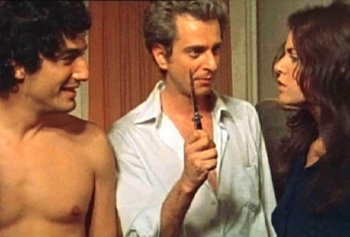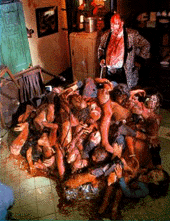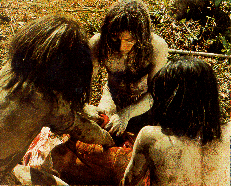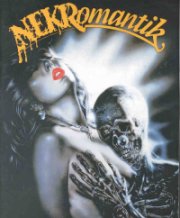
This month we take a look at the recent news regarding changes in policy on censorship in the United Kingdom :
A burst of excitement recently erupted around the horror fan scene in the UK with the announcement of new censorship guidelines being issued by the British Board of Film Classification. Since the introduction of the Video Recordings Act in 1984, UK horror fans (and the industry alike) have suffered with heavy censorship and the outlawing of many genre films. Here we'll look at the new guidelines in relation to the UK horror scene with comments from the Directors of the BBFC on the various related subjects.

BBFC Director Robin Duval on the New Guidelines :
"...although we have responded to the public's desire for a more relaxed approach to 18, it will not be a case of 'anything goes'."
The Board hosted public meetings across the country, from London to Edinburgh and back again, they were said to be 'vivid and illuminating'. Information gathered from Citizen Juries, National Surveys and Internet/Postal Questionnares was carefully gathered together and formed a Report for the BBFC by 'expert' Pam Hanley.
Screen Violence :
An interesting thing to note with regard to violence in films from the report was that 46% of people agreed 'watching violence in films generally makes people more likely to be violent in real life'. But of the 'Citizen Juries' three quarters disagreed with it after hearing evidence from 'expert witnesses'.
BBFC Director Andreas Whittam Smith on Screen Violence :
"I have often thought if I ever had the misfortune to be mugged in the street I hope I have the time to ask my assailant, 'Is that stylised or is that comic, or is that just an ordinary bit of violence?' I wonder if we can always be sure of the difference."

The BBFC firstly looked at the 'legal considerations', that is the laws that are already in place. Firstly 'The Cinematograph Films (Animals) Act 1937' and 'The Protection of Children Act 1978' are both welcome laws that, although prevent any hope of seeing most of the old cannibal gut-munchers in an uncut form due to their unpleasant (and unwelcome) use of animal mutilation, they do at least protect the 'innocents' of life.
But, when they mention 'The Obscene Publications Act 1959' you know we are in trouble. The act states 'it is illegal to show a work which is obscene. A work may be found obscene if, taken as a whole, it has a tendency to deprave and corrupt (ie make morally bad) a significant proportion of those likely to see it.' Now how open to interpretation is that one ? The BBFC state the 'interpretation rests with the BBFC' so they do have an ideal get out clause if questioned on the decisions of censorship of any horror movie.
Although the BBFC do indeed state that 'adults should be free to choose what they see', they go on to say 'providing that it remains within the law and is not potentially harmful to society'. Although the BBFC themselves state that 'The Guidelines, however are not a legal document..' they are still going to make sure their fully enforced.
But what do the new Guidelines have to say about our beloved Horror genre. Well, they state : 'Horror films are sublect to the same Guideline constraints as all other films. The BBFC recognises that audiences pay to see horror films because they like being frightened. The Board does not cut films simply because they alarm or shock. Instead, it classifies them to ensure that the young and vulnerable are protected.'
Regarding violence in films they say 'Violence has been a feature of entertainment for children and adults since the first stories were told. It is an element in many serious representations of the human condition.'
But don't get excited, many genre films will never see the light of day here in the UK yet. Take films like 'I Spit on your Grave' and 'New York Ripper' - the BBFC say it still has a 'strict policy on rape and sexual violence'. And what about 'Nekromantik' when they state that the 'portrayal of necrophilia' is 'not acceptable'.
The BBFC Directors discuss 'Last House on the Left' :
Robin Duval : "We did not throughout my first year here, 1998, reject any film for the cinema. Indeed, it is only during this year that we have rejected one, a particularly violent film, 'The Last House on the Left', where there was a pretty incendiary mix of sex and violence. Whether we would feel more relaxed about that now as a cinema film, frankly I rather doubt, because that mix of sex and violence still features as a major concern in the guidelines."
Andreas Whittam Smith : "I think we should say, Robin, and you will correct me if I am wrong, that in the case of 'Last House on the Left' we suggested cuts to the film-maker and he refused to make them. That was a sort of impasse."
Robin Duval : "I think that is important to say, yes."
Andreas Whittam Smith : "And so if he was to come back with the cuts then we would give the go ahead."
So as for the UK horror DVD/Video scene, think on this statement before getting your hopes up also : 'The BBFC respects the right of adults to chose their own entertainment, within the law. It will therefore expect to intervene 'only rarely' in relation to '18'rated cinema films. In the case of videos, which are more accessible to younger viewers, intervention may be more frequent.' But they do also say 'There are no constraints at this level on theme, language, nudity or horror' so only time will be able to tell how the future of the UK horror scene will be.
 A final thought on the potential problems that genre films face lies in their statement regarding the 'rejection' of some films : 'Films or videos which are unlawful or potentially harmful will, where possible, be cut. If this is not possible or not acceptable to the distributor, they may be refused classification altogether. 'Taboo' themes are acceptable, but not if their treatment is likely to encourage harm to viewers or, through their behaviour, to society.' Amongst the subjects that concern the BBFC are 'graphic rape or torture, sadistic violence or terrorisation, illegal or intsructive drug use, sex accompanied by non-consensual pain, injury or humiliation; bestiality or necrophilia, or other material likely to be found obscene by the courts.'
A final thought on the potential problems that genre films face lies in their statement regarding the 'rejection' of some films : 'Films or videos which are unlawful or potentially harmful will, where possible, be cut. If this is not possible or not acceptable to the distributor, they may be refused classification altogether. 'Taboo' themes are acceptable, but not if their treatment is likely to encourage harm to viewers or, through their behaviour, to society.' Amongst the subjects that concern the BBFC are 'graphic rape or torture, sadistic violence or terrorisation, illegal or intsructive drug use, sex accompanied by non-consensual pain, injury or humiliation; bestiality or necrophilia, or other material likely to be found obscene by the courts.'
Andreas Whittam Smith on Censorship :
"Of course every now and again people want us to be banished, and the anticensorship lobby of course would certainly wish to get rid of us lock, stock and barrel. But no government wishes to..it is just a permanent fact about governments; they do not wish to do this stuff themselves, they do not want the resulting flak themselves. They would much rather have us wriggling under the public criticism. One comment I noted when I saw the Home Secretary a few months ago, was when he said, 'As you know, I never comment on individual decisions', and he absolutely never has, and I am sure he never would."
Back to the Spotlight page